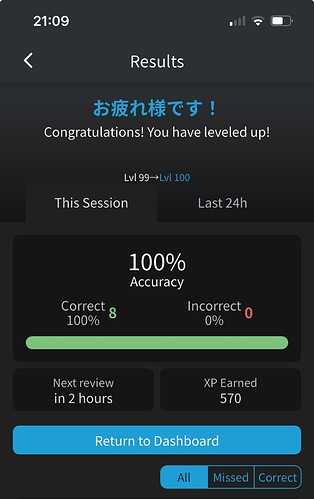After almost 4 years on Bunpro I’ve finally made it to the elusive level 100! I’ve still got a long way to go but it’s very nice to look back on my journey and see how much I’ve progressed. And finally, I’ll almost be done with all the grammar on Bunpro (although I hear more is planned to be added). Right now I’m studying as much vocabulary and grammar as I can before I take the N1 exam in a month, so this really does feel like the final push.
I feel like the past 12 months especially have been very productive as I was barely an N4 level and now I definitely feel that I’m an upper intermediate level. I can easily read books and play games in Japanese (although my listening is still a little iffy) and my study methods have definitely become a lot more streamlined and efficient. I know that taking the N1 just a year after barely passing the N4 is a really foolish decision, and I actually was originally planning on taking the N2 as I felt confident I’d pass that since I’m learning N2 content at university, but something inside me convinced me to take the N1 instead. In fact, through effective anki usage, I’ve been able to learn more than 2,500 N1 vocabulary in just 6 months!
But whilst I’ve learnt countless vocabulary and grammar over these past 12 months, I wouldn’t say I’ve “mastered” the great majority of them, I do have a strong grasp on them but I feel it’ll take quite a bit more immersion to really know the information inside and out. And despite learning some several thousand (I actually don’t know the exact amount although I estimate it to be somewhere between 5000~6500) vocabulary in the last year it feels like it’s never ending. Well, I guess it kind of is. I’ve known English my whole life and I still learn new words pretty often (like ‘demagogy’, thanks to that N1 vocab book) so I’ll definitely be learning more Japanese words as life goes on, but I’m really just talking about actively learning words. As in, making flashcards and consistently reviewing them. I think I could probably stop actively reviewing vocab now, since it’s actually quite rare I come across a Japanese word I don’t know when I’m on social media or playing a game (apart from specialist words or slang, damn you slang!) but since I’m close to finishing the vocab decks on Bunpro I don’t see a point in stopping here.
Grammar definitely feels a lot easier now. It’s difficult to describe it, but they just make more sense now, I guess because my grasp on the fundamentals of Japanese grammar became much better recently, seeing advanced grammar points ironically does not feel as difficult or overwhelming as it did when I was learning N5 and N4 grammar. N2 and N1 grammar just seems a lot more nuanced and specific which in a way makes them a lot easier to wrap my head around. It’ll be a great day when I study the final grammar point on Bunpro (Bunpro devs please don’t release the new grammar this summer, I’d like a break).
Speaking of the summer, as soon as the N1 exam is over I won’t be learning anything new on Bunpro or Anki, just slowly whittling down my reviews as I prepare for my year abroad in Japan in September. It’ll feel very weird to actually give my brain a break but it’s served me well so I’ll give it the rest it’s been pestering me for these past few months.
This post became a lot longer than I anticipated, but in conclusion Bunpro is a great study tool, I’m almost done with all of the JLPT Vocab and grammar, I’ve finally hit level 100, and, once again, please don’t release the new grammar this summer. Joking (not joking).

